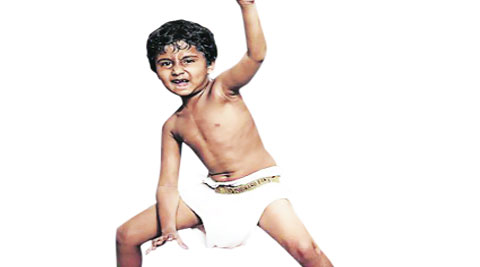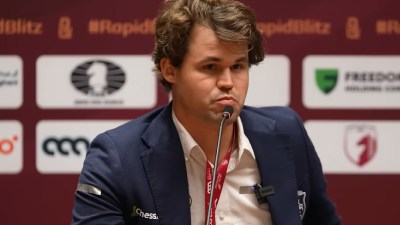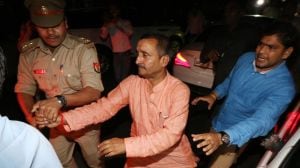Click here to follow Screen Digital on YouTube and stay updated with the latest from the world of cinema.
No Child’s play
Child actors are perhaps most susceptible to fall prey to vicissitude of time, when they find themselves at the cross-roads, unable to find work once their charm wears off. Screen analyses the pitfalls of facing success at an early stage and how these children cope in life later
 A child actor in action
A child actor in action
Made under the aegis of the Children’s Film Society of India, Jaldeep (1956) was the first film directed by Kidar Sharma with children playing a major role in the adventure drama. Since then, innumerable films with children either as the main protagonist or playing significant roles have been made. Be it espousing a social cause, providing a twist or adding a sublime touch to the story, children are like a breath of fresh air, using their innocent charm to woo the audience. While the audience is regaled by their antics on screen or empathise with their plight depending on the content of the film, little attention is paid to the psyche of the child, the changes in emotional or behaviourial patterns that he or she may go through during the making of the film and once the spotlight shifts from them. Basking in the lime- light, child actors, if not handled carefully may go down the wrong path, or even fade into oblivion once the first flush of success wanes off. The recent incident of actor Shweta Basu Prasad who won accolades and the National Award for her performance in Makdee walking the wrong path brings into sharp focus the plight of child actors on the periphery of adulthood. There have been several instances in the past, when actors who have been highly successful as child artistes find it difficult to find a place in the industry once their cherubic charm fades away. Does then, the price that these children pay in terms of lost childhood, an impinged education compensate for those ephemeral moments of glory? Sachin Pilgaonkar, one of the most successful child actors who made his acting debut at the tender age of five years in the Marathi film, Ha Majha Marg Ekla (1962), believes that education takes a major backseat when a child enters the film industry. “However best you try to talk to the film-maker, if you have to meet a deadline, you have to shoot with them. The attitude is, ‘never mind, let him miss school, we’ll do something about it. It is very difficult for the child to catch up with the portion he has lost out on. So it becomes a different kind of frustration for the child, which he is unable to cope with. The matter worsens when he is starstruck, and starts enjoying his popularity and stardom. In such cases, not only does the child miss out on his childhood, but also there is the danger that the child in you stops existing. It is a very dicey situation,” says Sachin, who believes that he was fortunate as far as films were concerned. “I was among the fortunate actors who played major roles in films, rather than play someone’s childhood character or brother. Because of this, my education did suffer.”
The sorrow and pathos that a child actor has to go through after he grows up and does not remain the same cute, child anymore, leads many down a path to oblivion. The situation is aggravated when the actor who has actually sacrificed his childhood on the altar of fame and money resorts to ways not approved of by society. Female child actors like Sarika, Meena Kumari, Sridevi, Neetu Singh, Aruna Irani did become successful heroines when they grew up, but for boys, according to Sachin, the going is tough. “I was, however, among the rare ones whose first film, Geet Gata Chal as an adult was a super hit.,” says Sachin, who feels that his journey in films has been quite easy.
But, others may not be so fortunate as him. Standing on the threshold of adulthood, child actors who have once been successful, suddenly find that they have to struggle to get a foothold in the industry. While, child actors of yore were not as well-prepared when it came to having a back-up plan in case their career in the industry did not take-off, children today are more focussed and confident about themselves. They are quite prepared for the struggle ahead. Harsh Mayar, the child actor of I Am Kalam fame, does not believe in sitting on his laurels. Instead he has prepared himself in a manner that he is ready to face any challenges that come in his way to fulfill his dreams. For Harsh, who cannot think of an alternate career besides acting, says that there is a vast change in him from the I Am Kalam Harsh and the one he is today. “I am preparing myself to face the challenges ahead. In the future even if I get a small character role, I will do it in a way that it shall leave an impact in the audience’s mind. I cannot think about anything but acting. I am confident about myself and my capabilities. Besides, actor ki zindagi mein struggle hi hota hai. He struggles throughout his life. I come from a middle-class background and have seen my parents struggling and facing financial problems. So, I have matured before time. I am not the kind who will be swayed by circumstances,” he says.
Nitesh Tiwari, who has made Chillar Party and Bhoothnath Returns, feels that the problem begins when, “The children grow up because requirements for an adult actor and child are different. The child may not fit into the criteria of being the lead actor when he or she grows up. This should not disillusion them, that is why we talk to parents to not let the recognition get to their heads.”
With more avenues opening up, and stories on children being specially crafted not only in films but also on television, the talent pool has become that much more competitive. To watch young children especially, young girls being pushed by their parents into acting is very sad, feels film-maker Onir. “I get photographs of so many little girls powdered and with lipstick, et al. Children, who have the desire for theatre, acting, dance have the right to step into this field, as long as the right environment is provided by the industry. But in a country like ours, it is almost a joke to be discussing this,” he states.
For a child actor who has to face the pressure of studies and make time for shooting, can indeed be taxing on his or her health. There are some film-makers like Amole Gupte who had made Stanley Ka Dabba, keeping the child’s school schedule in mind and shooting during vacations or on weekends. But most of the time, that is not the case. According to Nila Madhab Panda, director of I Am Kalam and the forthcoming Hum Kitne Paani Mein (Jalpari), in India, “We change the entire schedule of the child— whether he has school or exam. Besides, we should take care that the child is protected and not exposed to anything wrong the way adults are. But we almost make them feel that they are also adults. Post release, I have seen huge emotional changes in the children with whom I have worked with; the child becomes very ambitious like his parents. One such child would continuously call me to ask when my next film would begin. We have to take care of the child who is starting his career of sorts at that age. It becomes the responsibility of the parents and producer- director to see that the child is not spoilt and does not become glamour struck. The onus of keeping the child grounded rests with the parents. But sometimes parents become so ambitious that they are willing to spoil the child’s education and concentrate on his/ her film career,” says Panda recalling an incident where the parents of a 13 year old girl wanted to shift base to Mumbai so that she would get more offers in films. “This is a dangerous sign and puts the child under a lot of pressure,” says Panda.
While the exceptions exist, there are parents who are particular that the child does not neglect his education or is spoilt because of the attention he or she receives. The parents of both Parth Bhalerao (Bhoothnath Returns) and Darsheel Safary, who was only nine years old when he made his debut as Ishaan in Tare Zameen Par, made sure that their son did not miss out on his studies. “We had a teacher go specially on the set and in between the shots, Darsheel was made to complete his homework,” says Mitesh Safary, Darsheel’s father. In fact, when Darsheel, an extremely good dancer, had participated in Jhalak Dikhhla Jaa 5 had a platoon of 10 teachers tutoring him for his 10th board exam after he completed the show in September. “Darsheel scored 84 per cent in ICSE board,” says the proud father, who has instilled in his child’s mind that fame and popularity are temporary and that he should concentrate on his completing his education. And for Darsheel who is studying in HR College in Mumbai, acting was something that came naturally to him. “I would stand in front of the mirror and make weird faces. However, I am very focussed on my studies. I need to have a back-up plan in case my film career does not work out. And even if it does, I can always juggle two careers. I have been taught to handle the pressure. If you are really passionate and love something, you will willingly make adjustments,” says Darsheel in a matter-of-fact way, who found it quite easy to cope with the attention after Tare… “I was quite young then. Now I am 17 years old so I guess it would be a little difficult to adapt to the change because you become a little more attached,” he says.
As for Parth, who has acted in a couple of Marathi films, facing the arc lights was not easy. Initially, he did not like the routine of the work involved. Besides the Pune boy, also missed his school and friends. But once, he got into the groove of things, he slipped into his role with effortless ease and soon began enjoying himself. And despite all the attention he received post the release of Bhoothnath Returns, Parth, who will be appearing for his 10th board exam this year, is quite firm that he wants to concentrate on his studies. “Films can happen once the exams are over. I am going to concentrate on my studies, because films are not a sure shot way of making a career. Competition is intense here. If I do not find work here, I will become an animal psychiatrist,” he says.
Whether or not, it would be correct to say that earlier child actors did not have the options to pursue several things, today, the new generation of child actors definitely have their ears to the ground. They are aware of the pitfalls that they may face once they grow up and are no longer the same cherubic child, once loved by the audience. While, there may be certain behaviourial changes that is bound to happen, the child actors we spoke to are confident about themselves and indeed believe that; to quote a line from Boot Polish, ‘Mutthi mein hai taqdir hamaari, Humne kismat ko bas mein kiya hai…’
farida.khanzada@expressindia.com
- 01
- 02
- 03
- 04
- 05


































